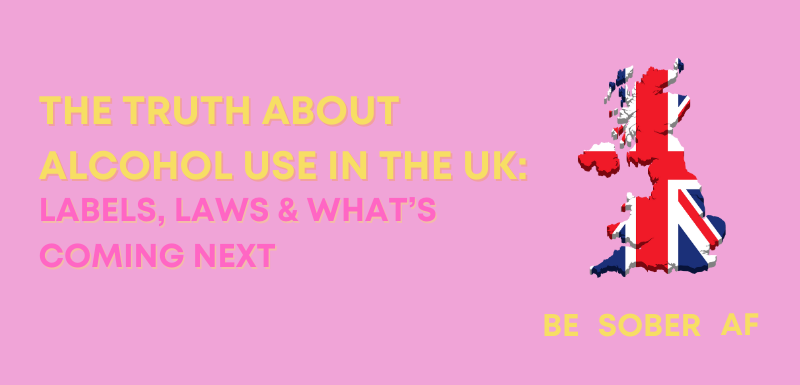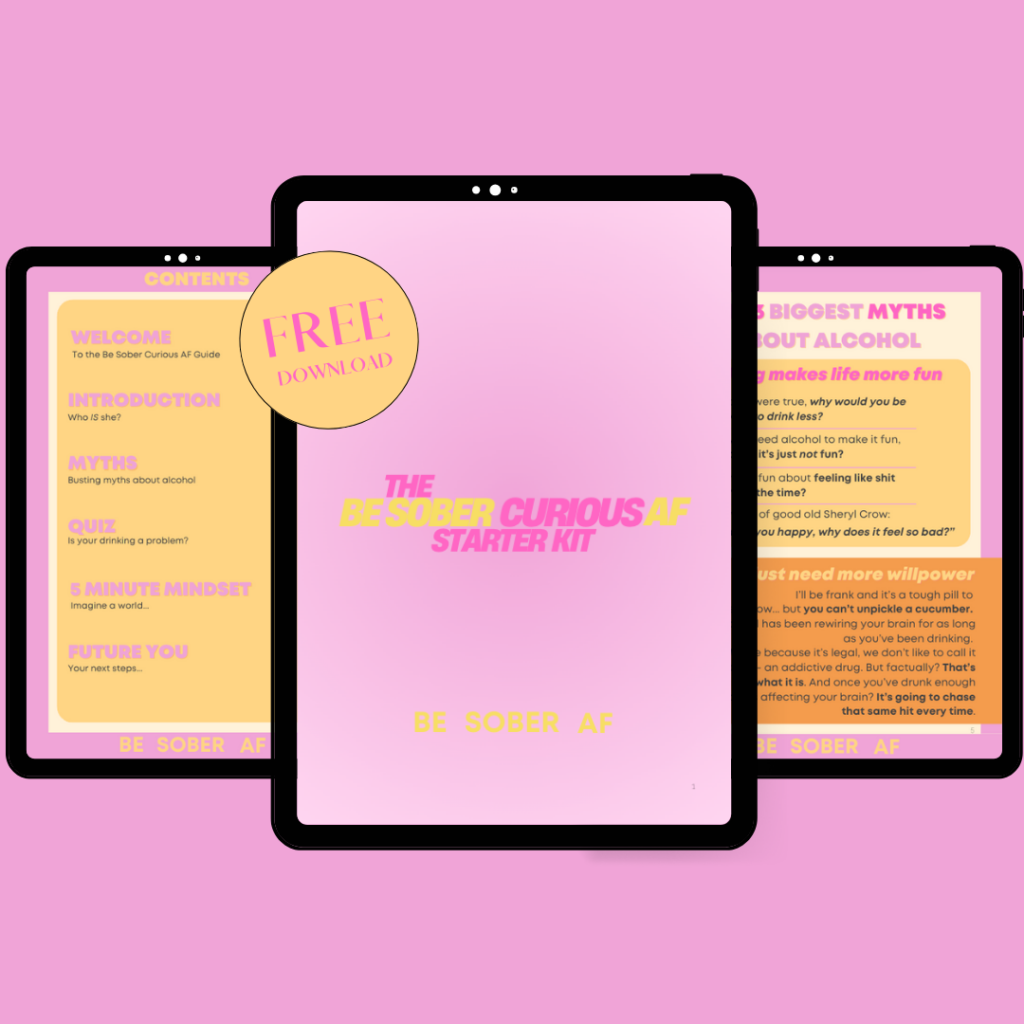The Truth About Alcohol Use in UK: Labels, Laws & What’s Coming Next
You might have noticed a surge in people ditching alcohol recently. From celebrities (yes even those who sell their own booze!), to the enormous sober curious movement felt online and even the increase in media reporting. More of us are turning away from alcohol for personal reasons. Gone are the days of needing to have a ‘problem’ in order to stop drinking. But, look around you and you might feel as though you are still in the minority as someone considering cutting it out, or having done so already. Our families still drink, as do our colleagues and our friends. But, you only need to look at the rapid increase in alcohol free sales to acknowledge that consumer behaviour is changing. In this article we look at the truth about alcohol use in the UK & how data, science and the industry itself is shaping the future.
Interested in changing your relationship with alcohol for the long-term? Check out the 31-day Alcohol Free Transformation Course here. Or, subscribe & get your FREE Sober Curious Starter Kit here.
Some links in this article are affiliate links. If you make a purchase, you’ll be supporting this platform at no extra cost to you – thank you!
Alcohol-Related Deaths Are at an All-Time High
In 2023, alcohol specific deaths in the UK reached an all time high. A staggering 10,473 people died due to alcohol related causes. That is a 33% increase from 2019 (pre covid!). (Source: ONS).
It’s worth noting that these figures only include those where health conditions were a direct consequence of alcohol, so it doesn’t include deaths from drink driving for example. So, the number would in fact be higher than this. (RAC data shows that around 300 people a year are killed by drink driving).
If you’re thinking, health conditions relating to alcohol feel a bit far fetched, I implore you to watch Panaroma: Binge Drinking & Me which focuses on the worrying rise in alcohol related illness in women under 40.
And if you’re thinking those numbers still don’t seem that high, wait until you wrap your head around this statistic… In 2019/2020, a whopping 280,000 people were admitted to hospital with the main attributed reason being alcohol. (Source: NHS). In fact, it’s estimated that Alcohol costs the NHS £3.5 billion (with a B), per year in England. And, a further est £21 billion per year to society as whole. (Source: Parliament). If you’re scratching your head over let me clarify – it’s estimated that tax from alcohol raised £12.4 billion in 2024. (Source: Office for Budget Responsibility).
So, if you’ve been feeling like alcohol might be slowly ruining your health or that of those around you, you’re not being dramatic. It’s very real, potentially very harmful and it’s costing us all.
WHO Is Calling for Cancer Warning Labels on Alcohol
The World Health Organisation has issued strong recommendations that alcohol should come with cancer warning labels, just like tobacco.
Alcohol is classified as a Group 1 carcinogen (same category as asbestos and cigarettes), but almost no one knows this. The WHO argues people have a right to know the risks. (Source: WHO).
The report details that Big Alcohol supports the introduction of QR codes on bottles so that the consumer can seek further information themselves – but studies showed that only 0.26% of shoppers bothered to scan the QR code.
Currently Ireland & South Korea are the only two countries implementing the mandatory warnings on alcohol bottles that include information about the link between alcohol and cancer & liver disease.
What’s your thoughts on this? I’d love to hear from you. Do you think warning labels should be included on bottles of alcohol? Do you think it will make a difference?
The Push to Redefine “Alcohol-Free” in the UK
Right now, in the UK, only drinks with 0.05% ABV or less can be labelled “alcohol-free.” Meanwhile, in Europe and the US, the threshold is 0.5% ABV. (0.5% in the UK is currently considered “low alcohol”).
Brewing at 0.05% is much harder and more expensive than crafting a drink at 0.5%, so right now, the British Beer and Pub Association is lobbying the government to align the UK with international standards. (Source: The Drinks Business). This might also open the floodgates for more international brewers currently selling 0.5% drinks to the European market, to the UK.
If you’re worrying about the increase in trace alcohol, it is worth noting that even a very overripe banana can contain up to 0.6% of alcohol! We are all for inclusivity and watching the alcohol free market boom, giving the people options they may not have previous considered. Let’s be honest, many will have been tarnished by the OG Beck’s Blue. God love it. But the mass consumption and growing alcohol free drinks market hopefully correlates with reduced alcohol intake! (Source: My dreams).
Public Health Campaigns Are Turning Up the Heat
The public conversation around alcohol is shifting. We’re starting to hold the industry accountable, not just the individual drinker. Alcohol is a legal drug, and for years, we’ve swallowed the idea that it’s harmless as long as you’re “not an alcoholic.” But that idea is changing.
Alcohol has now been strongly linked to 7 different types of cancer. (Source: Cancer Research UK). The WHO are pushing for warning labels and there’s even talks of England introducing a minimum unit pricing strategy (an MUP). What’s that? I hear you ask. It basically means the lower the % of alcohol, the lower the cost. The higher the %, the more expensive. So no more buying 2litre bottles of white lightening for a couple of quid anymore… This is being campaigned for by The Alcohol Health Alliance and you can read more about it here. This is already the law in Scotland and Wales by the way.
The goal? Less harm. More awareness. More people choosing not to drink – and realising they’re not alone.
You’re Not The Problem, The System Is…
So if you’ve ever tried to “just drink less” and failed? If alcohol has been wrecking your mental health, your motivation, your weekends or your relationships?
That’s not a you problem.
It’s a system designed to keep you hooked, to sell you the illusion of connection, celebration and confidence – while stripping away your peace, clarity and energy. Your decision to take a break from alcohol isn’t extreme – it’s wise. It means you’re waking up to the truth.
And trust me, the tide is turning.
If you’re ready to make a change, quit alcohol and reclaim your time, energy and health, there’s really no better time than the present! Not sure how to get started? Check out my 31 Day Alcohol Free Transformation course here to give you a jump start!
FAQ
Where Can I get More Information or Support?
For links to charities, sober community groups, helplines or sites to locate therapists check out our resources page here.

